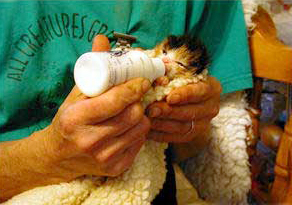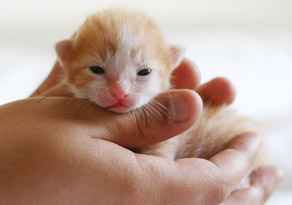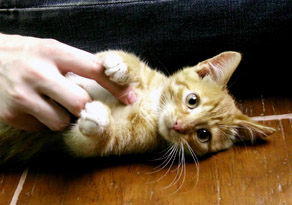 |
|
 |
|
 |
|
|

|
Warm the kitten
Little kittens do not generate heat, they need a heat source even on a summer day.
Also, it is dangerous to feed a cold kitten. For example, place the kitten on a
hot water bottle wrapped in a towel, in a box. The kitten should be out of direct
light and leave space for the kitten to crawl off the heat if she needs to.
|
|

|
Empty the bladder
Newborns cannot evacuate their bowel or bladder unassisted. The kitten may be in
pain or in danger from having to retain her own body waste. Gently stroke the kitten's
behind with a handful of tissue, keeping the tissue in contact. I prefer to use
warm damp cotton wool or tissues. This must be done before and shortly after every
feeding. The stool will be like yellow toothpaste. The urine should be pale. If
it is noticeably yellow the kitten is dehydrated.
|
|

|
Feeding
It is important to feed a specially produced Kitten formula. Cow's milk is not suitable.
In emergency you can feed the kitten Electrolyte drinks like Pocari sweat or Pedialyte.
These are not food and only serve to keep the kitten hydrated until you get suitable
formula.
|
|
|

|
Bottles
You can buy special miniature baby bottles; I prefer the model with a pointy nipple.
Pierce the nipple with a hot needle. Do NOT cut the nipple with a knife or scissors,
a big killer of kittens is getting milk in the lungs from too much flow or squeezing
the bottle. If you cut the hole too big do not use it. Try another nipple or buy
another bottle.
|
|

|
Syringes
If you cannot buy a kitten bottle (most vets and the SPCA sell them) try using a
small syringe. This is risky because it is easy to flood the lungs.
Feeding with a syringe must be slow and patient. Even a tiny amount of milk in the
lungs will kill.
|
|

|
Homing
By the time the kitten is eight weeks old she is ready to go to a loving, responsible
home. If you do adopt out your kittens, please spay or neuter them first, before
they start making kittens of their own (which they can before six months of age).
A healthy kitten can be safely spayed/neutered as early as eight weeks of age but
at the very latest should be sterilised by four months.
|
|
|

|
Frequency of feedings
Feed a newborn at least every four hours or on demand. Do not overfeed. Be prepared
to do night feedings.
|
|

|
Be observant
Monitor the kitten's daily progress closely. if there is failure to thrive, weight
oss, diarrhea, constipation, signs of distress, lethargy, or change in body temperature,
consult your veterinarian at once.
|
|

|
Fleas
Do not bathe, spray or powder a kitten before six weeks of age. Fleas can be removed
by hand and comb.
|
|
|

|
Weaning
This can be done at four weeks or slightly earlier. Start to mix some baby food
(chicken and chicken broth and beef and beef broth by Heinz and Gerber are both
good for this) into the warmed milk formula, a little at a time.
Soon she will be able to take it from your finger or spoon and then directly from
a bowl. At this point you can introduce her to the litter tray. By six weeks she
can eat solid kitten food.
|
|

|
Method
Heat the formula (in hot water) until it is comfortably warm. Shake the bottle to
even out the temperature. Put a fluffy towel across your lap. Hold the kitten belly-down,
try to center the nipple in the kitten's mouth, over the tongue, with the flavour
of the formula on the nipple. The kitten should begin to suck so don't squeeze the
milk in.
Be patient and calm and persistent, be extremely cautious about applying pressure
on the bottle. Keep the formula coming at a natural rate without squirting it down
the kitten's throat.
Watch the ears: If they start to go back and forth, the kitten is getting just the
right amount of formula. If formula bubbles out the nostrils, stop immediately --
you are drowning the kitten.
Do not overfeed, especially at the first meal. Many small meals are better than
one large one. Feed the kitten until she settles down and her tummy is full.
End by stroking the kitten all over to stimulate her, touch is very important and
will help her body to function and keep her contented. End by stimulating her to
empty her bladder and bowel.
|